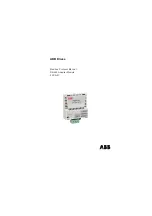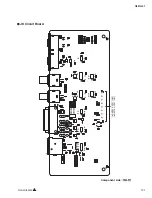
Page 11
4QD series controller instructions.
6 way connector
Note that this connector is underneath the top board
so refer to the 'features' diagram to identify the pin
letters. You will have to release the top board (four
‘Board Release’ screws on the features diagram) to
insert access the 6 way connector.
This connects the speed pot and the direction switch.
Direction change is by applying a voltage to pin C:
no voltage (pin disconnected) will give forward.
To reverse, connect this pin to a voltage, e.g. pin B or
bve.
There is also an inhibit pin: connecting this to 0v
will inhibit the action of the speed pot
The diagram shows the 6 way connector: open,
closed and dismantled, to show the two stage latches
which hold the cable grip in place. The cable grip is
the top section. The numbers correspond with the
'Features' diagram.
If you need to open a closed connector, this is quite
possible by gently lifting the ears of the cable grip
outwards to release then from the latch but take care
not to break them.
With the connector open, push the wires into the
holes in the cable grip from the front which is as
illustrated. The back has circular holes, not a slot.
When all the wires are in place, squeeze the
connector closed in a vice, or with a pair of parallel
jawed pliers.
Connections for each connector are shown, then
follow more detailed information on the controls.
1
1
1
ABCDEF
ABCDEF
ABCDEF
0v (ACW)
Centre
Top(+10.8v)
Reverse
+11.5v
Speed
Pot
Inhibit
{
F
E
D
C
B
A
12 Wiring - various
4 way connector
This is principally for the ‘ignition’ switch but two
spare pins are supplied, one connected to the
‘ignition line and the
second to 0v (battery –)
for a battery condition
meter or a reverse polarity
protection relay.
+24/36/48
Ignition
Meter +
Meter -
(+Batty)
3 way connector
This is for the electromagnetic parking brake brake
which connects between bve and the centre
pin. A third pin (0v or battery -) is supplied in case a
brake override switch is
required.
+24/36/48
(+Batty)
Brake
0v
Ignition switch
Connects bBatty and ‘Ignition’ on the 4 pin
connector. When the switch is open the control
circuitry is disabled, turning off the 4QD-200. When
closed the 4QD-200 is turned on. The current through
the switch is very small so a low current switch may
be used.
The controller will not work at all without this
connection.
The ignition is operated by a voltage so it can be
operated by applying a voltage from a source other
than the +Batty pin.
Ignition light
The diagram shows how an LED may
be fitted to act as an Ignition light. This
can be a useful diagnostic aid if the
controller shuts down because of
overheating, dud wiring or some other
fault. However such problems are
relatively rare so the LED is more
cosmetic.
Note that pin 2 is also +12v to the
direction switch and that pin 6 also
connects to the speed pot.
+
1K
resistor
F
E
D
C
B
A


































